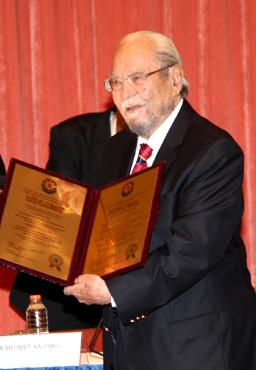Azerbaijan National Academy of Sciences Confers Honorary Doctorate on Prof. Halil İnalcık
BY ALP RODOPLU (HIST/VI)
Professor Halil İnalcık, renowned historian and founder of Bilkent University's Department of History, received an honorary doctorate from the Azerbaijan National Academy of Sciences on November 7 at Mithat Çoruh Auditorium. Prof. Yaqub Maxmudov, president of the Institute of History at the Academy, conferred the doctorate on Prof İnalcık on behalf of the Academy at a ceremony attended by many, including Mustafa İsen, the secretary general to the president of the Turkish Republic; Azerbaijan's ambassador to Ankara; Prof. Ali Doğramacı, chairman of the Board of Trustees and president of the University; Rector Abdullah Atalar; as well as faculty members, scholars, historians and a large number of students.
Photograph by Aydın Ramazanoğlu
The ceremony began with Rector Atalar's speech. Referring to the importance of Azerbaijan to Bilkent University and the Bilkent community -- a connection that may be traced back to founder İhsan Doğramacı -- the rector stated, "Today, the most prestigious academic institution of Azerbaijan is honoring the most prestigious hoca, academic and scholar of Turkey."
The panel that followed was moderated by Prof. Metin Heper, vice rector for academic affairs, with Prof. Özer Ergenç and Dr. Mehmet Kalpaklı of the Department of History and Dr. Berrak Burçak of the Department of Political Science as panel members.
This mini-symposium transformed the proceedings from a simple presentation of an honorary doctorate to a celebration of Prof. İnalcık and his work. While statements of praise and expressions of admiration and veneration are common at ceremonies of this kind, in this instance the tributes had unquestionably genuine substance.
Prof. Heper pointed to Prof. İnalcık's infinite energy and unceasing hard work: "Just as in a similar interview twenty years ago, in a newspaper article published only a couple of days previously, Halil Hoca talked about the numerous projects he was absorbed in."
Prof. Ergenç, one of Prof. İnalcık's oldest students, noted that throughout his long and successful career, Prof. İnalcık consistently chose the difficult: history, one of the most difficult disciplines in the social sciences due to its being a field in which knowledge is disputed; Ottoman history, a subject that had long suffered from scientifically suspect historiographical attitudes; and early Ottoman history, the branch of Ottoman studies for which sources are most scarce and problematic. Prof. İnalcık's contributions to history and Ottoman studies thus involve not only the significant production of original historical knowledge, but also the advancement of a historical method -- one with strict dependence on historical sources traceable to original accounts and interpretations free from speculation without foundation -- suited to the furthering and perfecting of that very historical knowledge.
Referring to Prof. İnalcık's invaluable contributions to Ottoman cultural history and literary studies, Dr. Kalpaklı talked of Halil Hoca's own poetic labors, unknown to many, which for Dr. Kalpaklı reaffirm the profound understanding Prof. İnalcık has of the Ottoman mind and world, an understanding repeatedly illustrated in his historical work.
Dr. Burçak's emphasis was on Prof. İnalcık's methods of teaching, which she deemed Socratic. Initially daunting for the student, the analytical and critical spirit adopted by such methods help decipher the paradigms and conceptual dynamics of historical discourse. It is through this systematic critique that the guiding motifs and historiographical tools and methods suitable for and natural to Ottoman history may be discovered, while extrinsic projections of Western paradigms are deconstructed and discounted.
Following the panel, Prof. Mahmudov began his speech, pointing out that Prof. İnalcık's work has had deep impact on his own studies and work. He asserted that Halil Hoca's corpus is a source of reference for the Turkic world and its historians, comprising the "heavy artillery" that may be called out against those who try to misrepresent and misjudge the history of the Ottomans.
Prof. Mahmudov then presented Prof. İnalcık with the honorary doctorate and gifts that included books and an Azerbaijani traditional rug.
Speaking last, Prof. İnalcık shared numerous insights concerning Azerbaijan and the Turkic world and its history. "Turkish as spoken by the Azerbaijani was the Turkish Turks spoke before they came to Anatolia," he said, "which they did via the lands of today's Azerbaijan, starting from the 1020s, the culmination of which movement was Manzikert in 1071." The ceremony came to an end after long applause following Prof. İnalcık's words. The audience that had gathered to witness him receive an addition to his collection of honorary doctorates ended up not only celebrating this great scholar and his far-ranging and -reaching work, but were also elevated to a greater historical consciousness with a deeper appreciation of history. For whether it is that of a people, a nation or even an individual, history, as was proven during the proceedings of this ceremony, always includes its great historians: those such as Halil Hoca.
